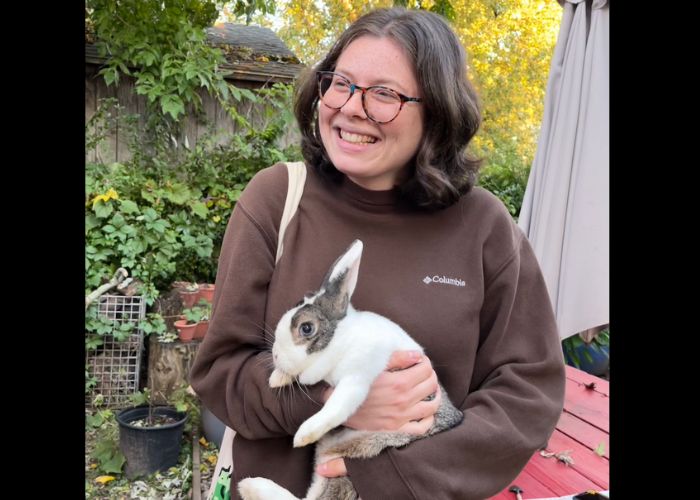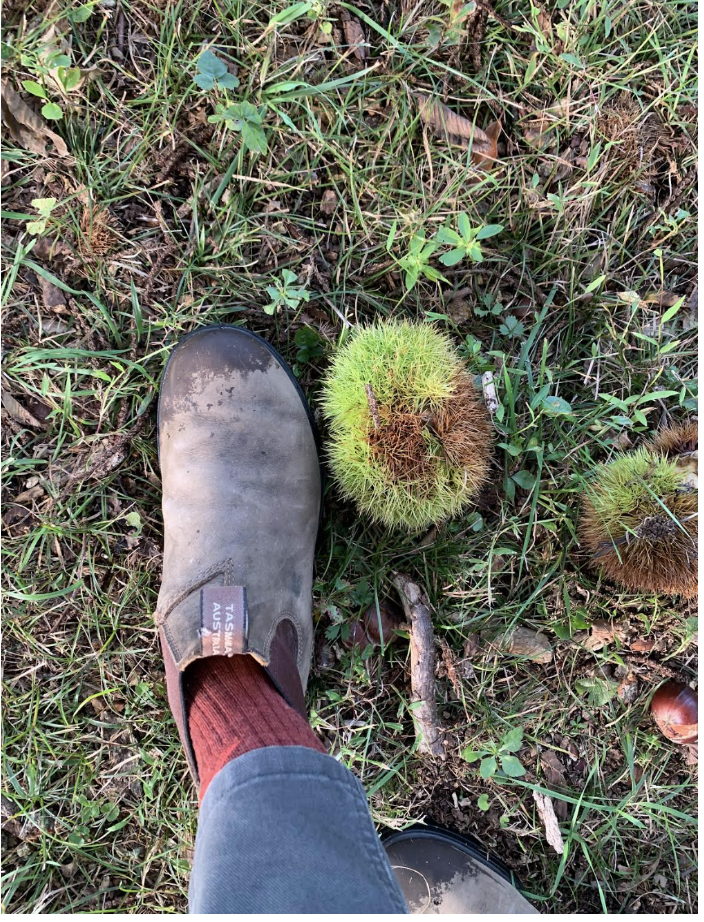
Hi, Bella! Would you tell me a bit about yourself, and how you found your way to Wesleyan?
I grew up in Nashville, Tennessee, and I transferred to Wesleyan in my sophomore year, when I realized I didn’t want to be in a big city for college. I actually worked with Lisa Stein ‘21 at an overnight camp the summer after I graduated high school, so Wesleyan was on my radar when I decided to transfer.
How did you become interested in the environment?
In my family we spent a lot of time outside, taking hikes and doing other activities, so I was always somewhat interested in the environment. I also did a semester school program when I was in high school. The program is called The Outdoor Academy in Pisgah Forest, Western North Carolina. I particularly became interested in waste systems. We took a trip to a landfill for the program, and I had never seen where my trash was going, and it really stuck with me. Then I went back to high school and I became the president of the environmental club and started getting compost in the school cafeteria. And then I came here to Wesleyan and realized that the compost interns were the coolest people in the Sustainability Office—you can quote me saying that!
What are your majors and academic interests?
My majors are the Science and Society Program (SISP) and environmental studies. I was interested in SISP because it allowed me to concentrate in environmental science and religion. I always liked having a variety of classes. I think SISP and ENVS have given me the tools to think critically about environmentalism and how I relate to it.
My favorite Science and Society and environmental studies course was Multispecies World Building: The American Chestnut Project, which I took last semester with Professor Elaine Gan. I feel like it was a combination of all of my academic interests. I’m super interested in agriculture and how agriculture can be used as a tool of colonization, and then also as resistance to those structures. It was cool to think about non-human agency and study a real world example with the genetically modified chestnut tree, and learn about what it means to release a genetically modified organism into forests.

What extracurricular activities are you involved in on campus?
I’ve been a compost intern in the Sustainability Office since my sophomore year. We manage the residential composting system, and we do a lot of waste education. Managing the residential composting system means helping maintain the bins themselves, so physically scooping the compost out of the bins and putting it into the bigger collection stream. Middletown has started a co-collection program, so we’ve been helping with the rollout of that and helping educate people who live in houses that use the Middletown waste system on how it works. We do tabling and host different activities on campus to help people learn about Wesleyan’s waste system so that people know where to throw out their stuff and where their waste goes. My boss, sustainability director Jen Kleindienst, is great, and she encourages the interns to get involved with other initiatives that are being facilitated through the Sustainability Office. Right now there is a lot of Earth Month planning happening! The other main group I’m involved with on campus is the WJC, the Wesleyan Jewish Community. I’m one of the coordinators for the community. I see Judaism and the cycles of nature, the environment, as very connected, and both are important to me.
What is the focus of your senior capstone project?
For my capstone, I’m working with Amy Grillo, associate professor of the practice in the Allbritton Center, on a project called The Other 1%, which refers to the 1 percent of farmers in Connecticut who are BIPOC. Last semester I took Amy’s class by the same name, which was focused on studying community-based participatory research. Through the class we started this project on farmers in Connecticut. We worked closely with four farmers. At the end of the class, we wrote portraits about each of the farmers based on several long interviews that we did with them. This semester I’m working with Amy again, and a couple other people from that class, on turning the portraits into a museum exhibit. It will be a multimedia exhibit experience including sections from those pieces of writing that we did, and a timeline that will have an overview of the history of discrimination in agriculture in the US. The exhibit will relate back to the experiences of farmers we have worked with.
Bella and her classmates are currently developing a number of ideas for their exhibit. In addition to walking attendees through the timeline of agricultural legislation, they will likely feature a map projection of all of the municipalities in Connecticut. This projection will highlight the regions where chicken ordinances are harder to obtain, and how certain demographics of people face greater challenges. Paired with the map will be an audio recording of the ordinances, showcasing how convoluted and confusing they can be. They also hope to include an interactive piece, where participants will use computers to attempt to navigate the process of registering one’s farm with the USDA to get a farm number.
One of the highlights of Bella’s experience was interviewing Travis Stewart, a farmer located outside of Hartford, and helping him close down his backyard farm for the winter. For more about Travis Stewart, check out Exploring Urban Farming with Travis Stewart.
Were there any common threads between the experiences of different interviewees?
We went into this project with the framing of wondering what the obstacles and pathways were to becoming a farmer in Connecticut for BIPOC people, and what we’ve realized after conducting these interviews and spending time with farmers is that our framing needed to change a little bit. The people we talked to really didn’t separate their pathways to becoming farmers from their obstacles. What I mean by that is that people tend to not focus on challenges and obstacles, especially if they are encountering so many. There was a lot of positivity and resilience, and a focus on moving forward and through challenges. That was definitely a common thread throughout all of their stories. Overall, the new farm bill needs to include programs that provide debt relief for farmers of color and address inequities in training and land access.
Do you have any advice for Wes students with similar interests?
I would tell them to take a class that they think is going to be too hard for them, because they will surprise themselves and realize that they can do it. I would also definitely recommend working in the Sustainability Office!